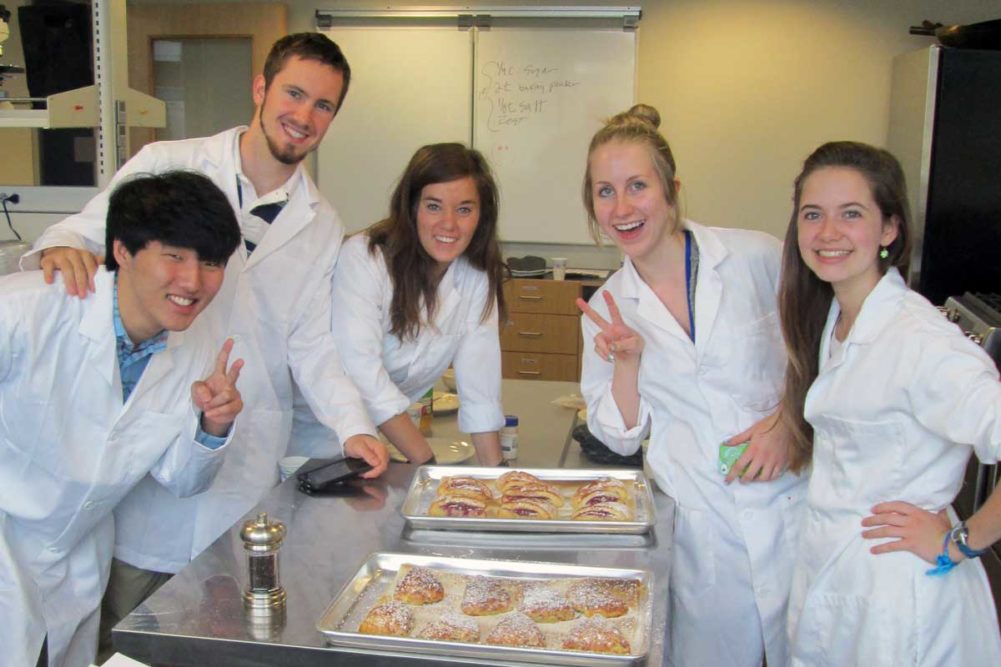Although she grew up in a family that’s “just a generation removed from the farm,” Abby Mitchell never fully understood how food companies operate, how the supply chain works — or even how food products are created.
That was until she enrolled in the Center for Advanced Professional Studies (CAPS), an innovative program developed by the Blue Valley School District in Overland Park, Kan. Here, juniors and seniors take specially designed classes that allow them to explore potential careers while working with industry professionals on real-world problems and projects.
“I knew where food production started, but I was very clueless to the in-between,” said Ms. Mitchell, currently starting her career as a marketing representative for John Deere. “I knew it started at the farm level, but as to how it got to my grocery store, I was completely in the dark. Quite frankly, I hadn’t even thought about it prior to CAPS.”
Founded in 2009, the CAPS Network consists of 69 programs in 125 school districts spread across 19 states and three countries. In this network that spans across the nation, students may sign up for courses ranging from science, technology, engineering and mathematics (STEM) to legal, medical and other disciplines.
One course focuses on the Future of Food where mentors from companies like Corbion and DuPont Nutrition & Biosciences in the Kansas City-area and Tyson Foods in Bentonville, Ark., open the doors to the food industry for students to see.
Overall, the curriculum in each location follows CAPS core values that include profession-based learning, professional skills development, self-discovery, exploration and others.
[Related reading: Building the next generation of food experts]
However, each program supports high-skill, top-demand careers through ongoing innovation in curriculum development and programs and services based on local business and community needs.
For Ms. Mitchell, a graduate of Kansas State University (KSU) with a bachelor’s degree in agricultural economics, CAPS courses flipped the switch and shed new light on a career in the industry at an early age.
The program led to an internship with the US Department of Agriculture Office of the Chief Scientist and participation in the World Food Prize Foundation’s annual competition that opened her eyes to the global food industry and its potential to do more than just put a meal on the dinner table.
“My generation doesn’t just want a paycheck at the end of the day, but we want to know that we’re doing a greater good, that we’re doing something not just for ourselves,” she said. “That’s such a huge motivator today, and if you are working in the food industry, you not only have that opportunity, but there is so much room for growth and development.”

For Laila Carter, the Future of Food class took the idea of STEM to a whole new level by taking the theory of science and making it more relatable to the real world.
Some of her most memorable experiences included collaborating with “an ice cream chemist” from DuPont to develop a gluten-free, ice cream cookie sandwich product for a class project and having a food microbiology internship with the company.
While she was a KSU student, Ms. Carter took what she learned from CAPS and developed Laila’s Thiccck Paleo Cookies that were sold at a local café/coffee shop chain in Manhattan, Kan.
“Once you’ve been through CAPS, everything that you do stems from CAPS,” she said.
Hearing from food professionals along with visits to local food operations gave her the firsthand knowledge that fed into the natural curiosity Ms. Carter gained from watching the show “Unwrapped” while growing up. Currently an account data analyst at Synexis, a biodefense firm, she never stops applying what she learned from CAPS.
[Related listening: New ideas for recruiting, retaining bakery employees]
CAPS, Ms. Carter added, provided a correlation between her biology classes and an understanding of how food companies work.
“That was the link,” she said. “That cool ‘aha!’ moment where you see it in action is part of CAPS.”
Jennifer Bauer, business development specialist for Blue Valley CAPS, pointed out that the Future of Food curriculum is a match for students with a penchant for STEM-based knowledge because the umbrella course blends in those disciplines so seamlessly.
“We’re just opening their eyes to the food industry,” Ms. Bauer said. “It is shocking that students have no idea where food comes from. It just appears like magic. It’s in your refrigerator or freezer. CAPS help them bridge that gap and understand where their dinner comes from.”
She added that the courses make students aware of the dynamics of food at an early age when they’re initially determining their potential career choices and before they invest tens of thousands of dollars in a college education.
In fact, CAPS feeds KSU’s Baking Science and Management program and other universities with a food science curriculum.






